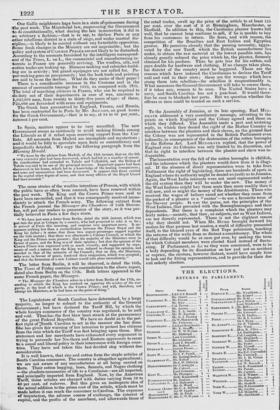To the Assembly of Jamaica, at its late opening, Earl
Mur.- GRAVE addressed a Very conciliatory message, adverting to the points on which England and the Colony agreed and those on which they differed. The Assembly made a pert and irritating reply, in which they denied the right of the Mother Country to interfere between the planters and their slaves, on the ground that the Colony was not represented in the British Parliament even indirectly, in consequence of the destruction of the rotten boroughs by the Reform Act. Lord MUL GRAVE replied, that the power of England over its Colonies was only limited by its discretion, and that its right to interfere between the planter and sla,ve was in- disputable.
The lamentation over the fall of the rotten boroughs is childish, and the inference which the planters would draw from it is illogi- cal. If the absence of direct representation were to take from Parliament the right of legislating, there are hundreds of spots in England where its authority might be denied as justly as in Jamaica. Again, the West India interests were not more represented under the old system than they will be under the new. The money of the West Indians might buy them seats then more readily than it will now, and so might the money of the Abolitionists. Those who received the wages of bribery cared not whether they came from the pocket of a planter or a "canter"—to use a favourite term of the Slavery people. It was the purse, not the principles of the West Indians, that prevailed with the Boroughmongers and their dependents. But there is a complaint which the planters may fairly make,—namely, that they, as subjects, not as West Indians, are not directly represented. There is not the slightest reason why they should not. When Mr. HUME brought forward his motion for that purpose last session, a world of difficulty presented itself, to the bleared eyes of the Red Tape politicians, touching the returns of the writs from so distant a constituency. The whole of that difficulty would be at once got over, by making the term for which Colonial members were elected fixed instead of fluctu- ating. If Parliament, as fa: as they were concerned, were to be a body depending for its dissolution on law and not on accident or caprice, the electors, however distant, would have ample time to look out for fitting representatives, and to provide for their due and orderly election.






















 Previous page
Previous page